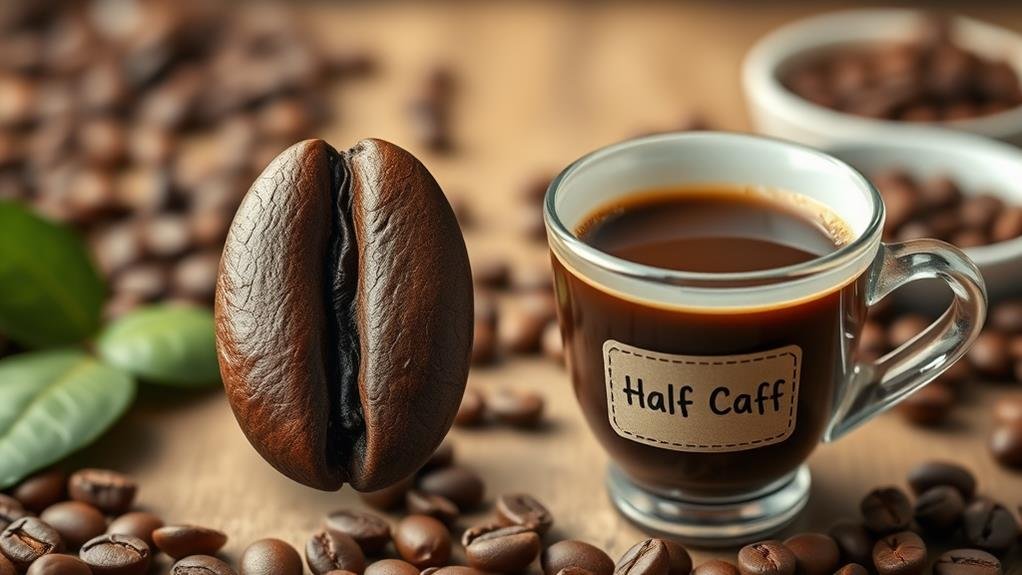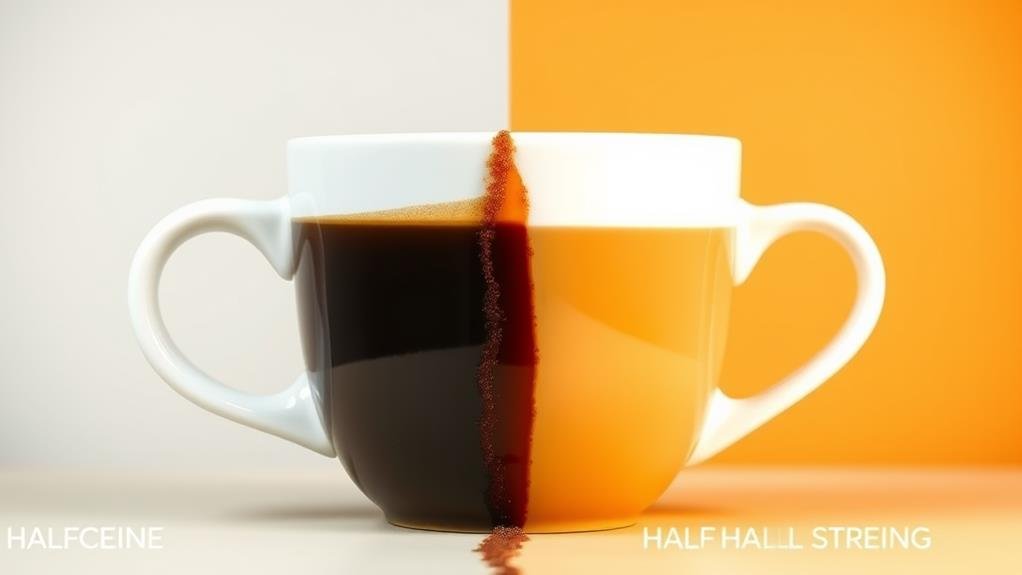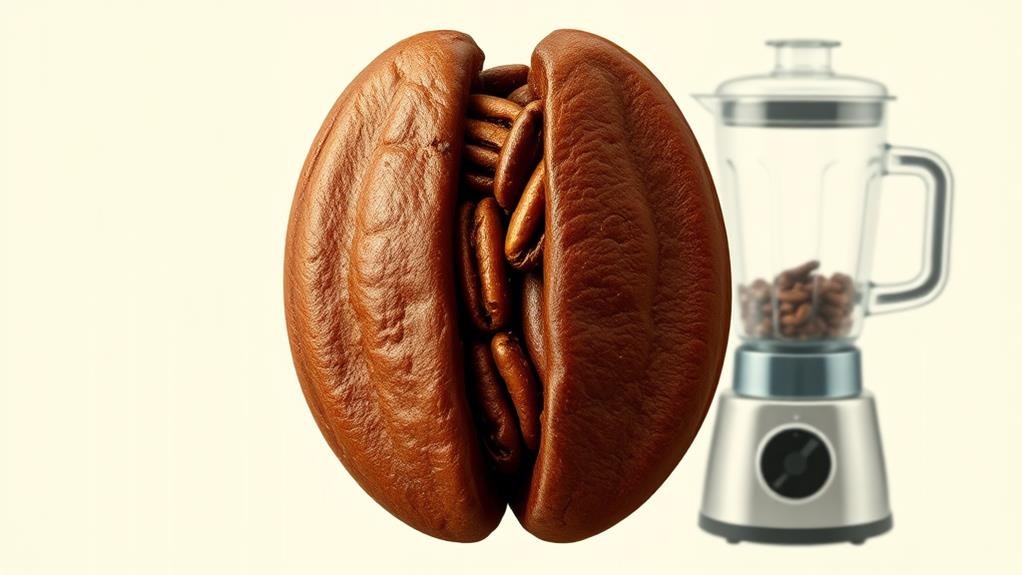As I ponder the balance between my love for coffee and my sensitivity to caffeine, I find myself drawn to Half Caff Coffee. Offering a moderate caffeine content of about 47mg per 8oz cup, Half Caff Coffee strikes a chord between regular coffee and decaf, providing just the right amount of kick without overwhelming. But what exactly sets it apart from decaf, and how can you tailor your own blend? These questions linger, making it essential to explore the nuances of Half Caff Coffee and its comparison to decaf, ensuring that you make an informed choice for your coffee preferences.
What Is Half Caff Coffee?

Half decaf coffee is exactly what it sounds like: a blend of regular and decaffeinated coffee. This combination provides a balance between the rich flavor of coffee and a reduced amount of caffeine. In essence, half decaf coffee splits the difference, offering around 50mg of caffeine per 8oz cup—half the amount found in regular coffee. The decaf portion typically removes 97% of caffeine from the beans, ensuring that you enjoy a flavorful cup with a lower caffeine impact. One of the benefits of half decaf coffee is that it allows you to control the ratio of regular to decaf if you choose to blend it yourself. This flexibility means you can tailor the mix to suit your personal taste preferences and caffeine sensitivity. Using the same type of beans for both regular and decaf parts of the blend helps maintain a consistent flavor profile, ensuring that the taste remains cohesive and enjoyable.
For those who want to limit their caffeine intake without sacrificing the richness of coffee, half decaf coffee is an excellent option. It offers all the flavor you love with less caffeine, making it a popular choice for those looking to balance their coffee habit with their dietary needs. Whether you're sensitive to caffeine or simply prefer a lower dose, half decaf coffee delivers a satisfying cup every time. If you're exploring options, consider decaf coffee production, which highlights various decaffeination methods that maintain flavor.
What Is Decaf Coffee?
Decaf coffee, a staple for those looking to reduce their caffeine intake, is made from regular coffee beans with most of the caffeine removed during processing. This process ensures that decaf coffee retains the flavor of regular coffee but has markedly less caffeine content. In fact, the decaffeination process can reduce caffeine levels by up to 97%, making it an ideal choice for those who want to avoid the stimulant effects of caffeine. Additionally, decaf coffee is available in various roasts, including dark, medium, light, and even instant coffee options, guaranteeing that consumers can find a flavor profile that suits their taste preferences. The methods used to decaffeinate beans are varied. One common method is the Swiss Water Process, which is chemical-free and relies on water to extract caffeine. Another method involves the use of chemical solvents to remove the caffeine from the beans. Regardless of the method, decaf coffee beans undergo roasting after decaffeination to develop their flavor profile.
Decaf coffee offers a similar taste experience to regular coffee without the high levels of caffeine. This makes it a popular option for people who want to enjoy the flavor of coffee without its usual caffeinated kick. If you're considering switching to decaf or combining it with regular coffee for a half-caf blend, understanding these basics can help you make an informed decision about your coffee choices.
Caffeine Content Comparison

When considering your daily coffee intake, understanding the caffeine content can be essential. Half Caff Coffee is a popular choice for those who want to balance their caffeine consumption without entirely giving up on the energy boost that coffee provides.
In terms of caffeine content, Half Caff Coffee lives up to its name by offering approximately half the amount of caffeine found in regular coffee. An 8oz cup of Half Caff Coffee contains around 47mg of caffeine. To put this into perspective, a standard 8oz cup of regular coffee typically has around 95mg of caffeine. This makes Half Caff Coffee a good option for those who need some energy but do not want to overdo it.
A tablespoon of Half Caff Coffee contains about 3mg of caffeine, which is notably less than what you'd find in a full-strength brew. This moderate amount can help you stay alert without the jitters or other side effects associated with higher caffeine intake. However, it's worth noting that the exact caffeine content in Half Caff Coffee can vary slightly depending on the brand and blend you choose. Overall, Half Caff Coffee offers just the right amount of caffeine for many caffeine-conscious consumers.
Pros of Half Caff Coffee
If you're looking for a coffee that strikes the perfect balance between flavor and caffeine, half caff coffee is an excellent choice. Unlike regular and decaf coffee, which may offer too much or too little caffeine, half caff coffee provides a middle ground that many people find ideal. It maintains the same rich flavor profile as regular coffee but with about half the caffeine content. This makes it particularly suitable for individuals who want to limit their caffeine intake without sacrificing the taste they love.
For those who are sensitive to caffeine or want to avoid its negative side effects, such as jitteriness or an inability to sleep, half caff coffee is a great alternative. It still offers a slight caffeine boost, which can be beneficial for alertness and energy without the full impact of regular coffee. By choosing half caff coffee, you can enjoy the richness of coffee while catering to your specific needs and preferences regarding caffeine intake. This option allows you to savor your coffee experience with less worry about overdoing it on the caffeine.
Cons of Half Caff Coffee

While half caff coffee offers a pleasing balance between flavor and caffeine, it also comes with some drawbacks. One significant con is its lower effectiveness in providing a significant energy boost due to its lower caffeine content. If you're someone who relies on coffee to get going in the morning or stay alert during long study sessions, half caff might not be enough to hit the spot compared to regular coffee.
Another potential drawback is the cost. Half caff coffee blends could be more expensive than regular coffee blends, which might deter some consumers who are on a budget. Additionally, availability can be a concern; half caff coffee might be harder to find in some stores or coffee shops compared to their regular or decaf counterparts.
Pros of Decaf Coffee
Decaf coffee, with its much lower caffeine content, is a great option for those looking to reduce their caffeine intake. Here are some key pros of decaf coffee that make it a valuable choice:
- Suitable for Evening Consumption: Because decaf coffee has virtually no caffeine, you can enjoy it in the evening without worrying about disrupting your sleep.
- Health Benefits: Like regular coffee, decaf coffee offers several health benefits, although the specific advantages may vary from person to person.
- Flavor Options: While some people find that decaf coffee lacks certain flavor nuances, many decaf coffees are now produced with processes that preserve more of the natural flavors.
- Chemical-Free Options: For those concerned about chemical solvents used in some decaffeination processes, there are chemical-free alternatives available.
Cons of Decaf Coffee

When considering decaf coffee, one must keep in mind that the decaffeination process can lead to a loss of flavor nuances compared to regular coffee. Some decaf coffees are also processed using chemical solvents, which may be a concern for certain consumers. Additionally, while decaf coffee is not completely caffeine-free and contains trace amounts, this might have potential health impacts for some individuals.
Flavor Nuance Loss
One of the primary drawbacks of decaf coffee is its potential loss of flavor nuances. When coffee is decaffeinated, the process can alter the taste profile, leading to a slightly different flavor experience compared to regular coffee.
Here are some key points to bear in mind:
- Flavor Alteration: The decaffeination process can change the flavor profile, making it less rich or complex.
- Aromatic Impact: Decaf coffee may lose some of its aromatic qualities, which can affect the overall enjoyment of the coffee.
- Depth and Complexity: Some coffee enthusiasts believe that decaf coffee lacks the depth and complexity found in regular coffee.
- Retained Flavor: While decaf coffee retains much of the flavor of regular coffee, connoisseurs may still notice a difference.
These changes can be subtle but significant for those who appreciate the intricate flavors and aromas of coffee. The removal of caffeine and the subsequent processing steps can diminish some of the nuanced notes that make regular coffee so appealing. For many, this loss of flavor nuance is a notable con when contemplating whether to choose decaf over regular coffee.
Chemical Solvent Concerns
Concerns about chemical solvents pose a significant drawback for many decaf coffee consumers. When discussing decaffeinated coffee, the process of removing caffeine often involves the use of chemical solvents such as methylene chloride or ethyl acetate. While regulatory bodies like the FDA and EPA evaluate the residue levels of these solvents as safe, some consumers remain cautious.
Decaffeination Methods Comparison
| Method | Solvent Used | Residue Concerns |
|---|---|---|
| Chemical Process | Methylene Chloride/Ethyl Acetate | Potential residues |
| Swiss Water Process | Water | No chemical remnants |
| CO2 Process | Carbon Dioxide | No chemical remnants |
For those who prefer to steer clear of chemical remnants entirely, alternatives like the Swiss Water Process or CO2 method are available. These approaches utilize water or carbon dioxide instead of chemical solvents, addressing concerns about potential health hazards. However, even in traditionally decaffeinated coffee, the levels of solvents present are controlled and deemed safe by health authorities.
This decision underscores a balance between convenience and peace of mind when choosing decaffeinated coffee. Understanding the decaffeination process can assist consumers in making well-informed choices based on their individual preferences and health considerations.
Potential Health Impact
Decaf coffee, while appealing for its lower caffeine content, poses several potential health impacts that consumers should be aware of. Here are some key considerations:
- Lack of Flavor Nuances: The decaffeination process can strip away some of the flavor nuances found in regular coffee, which might affect overall enjoyment and satisfaction.
- Chemical Solvent Concerns: Some decaf coffees are processed using chemical solvents, which can be a concern for those who prefer organic or chemical-free products.
- Trace Amounts of Caffeine: Although decaf coffee has notably lower caffeine content than regular coffee, it may still contain trace amounts that could affect individuals who are sensitive to caffeine.
- Health Benefits and Variability: The benefits of decaf coffee can vary among individuals, and it's important to consult with a healthcare professional if you have specific health conditions.
Understanding these points can help you make an informed decision about whether decaf coffee is right for you. While both regular and decaf coffees offer health benefits, their flavor profiles and caffeine content differ significantly. Being aware of these differences will allow you to choose a coffee option that aligns best with your preferences and health needs.
Key Differences: Half Caff Vs Decaf
When it comes to choosing between Half Caff and Decaf coffee, several key disparities stand out. One of the most notable contrasts is the caffeine content. Half Caff coffee contains roughly half the caffeine of regular coffee, while decaf coffees are nearly caffeine-free.
| Coffee Type | Caffeine Content | Taste and Aroma |
|---|---|---|
| Half Caff | Half of regular | May vary due to blending process |
| Decaf | Almost none | May vary due to decaffeination process |
| Regular | Full | Standard taste and aroma |
Individual preference plays a pivotal role in this decision. If you're looking for a slight caffeine boost but want to limit your intake, Half Caff is a better option. However, if you're highly sensitive to caffeine or prefer no caffeine at all, decaf might be the way to go.
Trying both options is recommended to determine the best fit based on your personal caffeine sensitivity and flavor preferences. The taste and aroma can also differ significantly between Half Caff and decaf due to the different processing methods involved. Understanding these differences will help you make an informed choice that suits your needs.
Making Your Own Half Caff Blend

After understanding the key differences between Half Caff and Decaf coffee, you might be curious about how to create your own perfect blend. Making your own half caff blend is a great way to tailor your coffee to your taste preferences and caffeine needs.
Here are some reasons why you might want to try this:
- Control over caffeine ratio: You can adjust the mix of regular and decaf coffee beans to suit your preferred level of caffeine intake.
- Flexibility in blend choices: You're not limited to pre-made blends; you can combine any combination of your favorite regular and decaf coffee beans.
- Consistent flavor: Using the same blend or roast for both regular and decaf guarantees a consistent flavor profile.
- Cost-effective: Creating your own half caff blend can be more budget-friendly than purchasing pre-mixed half caff coffee.
Experimenting with different ratios allows you to find the perfect balance of flavor and caffeine. This process is straightforward: simply measure out the desired proportions of regular and decaf coffee beans, mix them together, and brew as usual. By managing the ratio yourself, you guarantee that every cup meets your personal standards for taste and caffeine content. This approach makes enjoying coffee with less caffeine both customizable and cost-effective.
Conclusion
Half Caff Coffee strikes a balance between flavor and caffeine, offering a moderate 47mg per 8oz cup. Unlike decaf, which is nearly caffeine-free, Half Caff allows you to enjoy the taste of regular coffee while keeping your caffeine intake in check. It's the best of both worlds, "killing two birds with one stone" by providing flavor without the full caffeine kick. This makes it an ideal choice for those who want to moderate their caffeine consumption without sacrificing taste.

